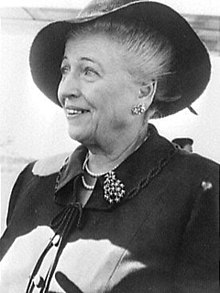Pearl Buck
| Pearl S. Buck | |
|---|---|

Pearl Buck, ca. 1972.
|
|
| Born | Pearl Sydenstricker June 26, 1892 Hillsboro, West Virginia, U.S. |
| Died | March 6, 1973 (aged 80) Danby, Vermont, U.S. |
| Occupation | Writer, Teacher |
| Nationality | American |
| Subject | English |
| Notable awards |
Pulitzer Prize 1938 |
| Spouse |
John Lossing Buck (1917–1935) Richard J. Walsh (1935–1960) until his death |
|
|
|
| Signature |  |
| Pearl S. Buck | |||||||||||
| Traditional Chinese | 賽珍珠 | ||||||||||
|---|---|---|---|---|---|---|---|---|---|---|---|
| Simplified Chinese | 赛珍珠 | ||||||||||
| Literal meaning | Precious Pearl | ||||||||||
|
|||||||||||
| Transcriptions | |
|---|---|
| Standard Mandarin | |
| Hanyu Pinyin | Sài Zhēnzhū |
| Wade–Giles | Sai Chen-chu |
| IPA | [saɪ˥˩ tʂən˥ tʂu˥] |
Pulitzer Prize
1932
Pearl Sydenstricker Buck (June 26, 1892 – March 6, 1973; also known by her Chinese name Sai Zhenzhu; Chinese: ) was an American writer and novelist. As the daughter of missionaries, Buck spent most of her life before 1934 in Zhenjiang, China. Her novel The Good Earth was the best-selling fiction book in the United States in 1931 and 1932 and won the Pulitzer Prize in 1932. In 1938, she was awarded the Nobel Prize in Literature "for her rich and truly epic descriptions of peasant life in China and for her biographical masterpieces". She was the first American woman to win the Nobel Prize for Literature.
After returning to the United States in 1935, she continued writing prolifically, became a prominent advocate of the rights of women and minority groups, and wrote widely on Asian cultures, becoming particularly well known for her efforts on behalf of Asian and mixed-race adoption.
Originally named Comfort by her parents, Pearl Sydenstricker was born in Hillsboro, West Virginia, to Caroline Stulting (1857–1921) and Absalom Sydenstricker. Her parents, Southern Presbyterian missionaries, traveled to China soon after their marriage on July 8, 1880, but returned to the United States for Pearl's birth. When Pearl was five months old, the family arrived in China, first in Huai'an and then in 1896 moved to Zhenjiang (then often known as Jingjiang or, in the postal, Tsingkiang), near Nanking.
...
Wikipedia
